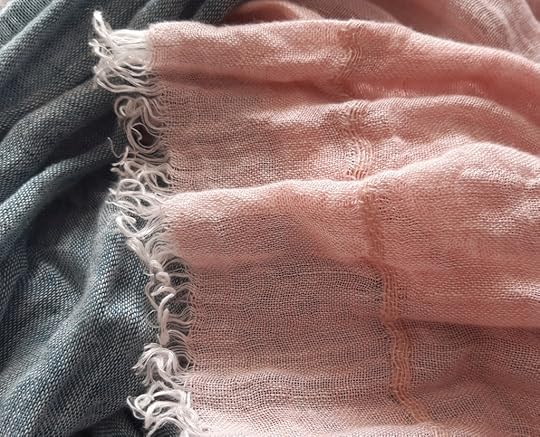From Combs to Hecklers – a Word History
Hello,
This week’s word is heckler with thanks to Susie Dent’s “Modern Tribes” which mentioned the original hecklers and set me on the etymological trail. The two areas where hecklers are most common today are at comedy gigs and political performances. In both cases the general public feel they have the right to yell out their disagreement. It can be witty, or simply angry, but either way it’s not easy to deal with the heckler if you’re the focus of their attention.
The origins of the heckler surprised me. It started with a comb and a woman.
The first use of heckle in English dates to 1300 when it was a flax comb and was spelled hechel. It either came from hecel in Old English or from a Germanic source. Middle High German had hechel and Middle Dutch had hekel, both of which come from a root word for a hook or tooth.
 My favourite linen scarf (after heckling!)
My favourite linen scarf (after heckling!)Flax, in case you were wondering, is a plant also known as linseed, which is grown for food and fibres. Flax fibres give us linen yarn and fabric. Like other yarns, such as wool, the flax fibres need to be combed out before spinning, hence the heckle comb.
Shortly after the arrival of the comb we were using heckle as a verb, meaning to comb flax or hemp with a heckle. By the mid 1400s we had heckler as a noun for somebody who uses a heckle, although apparently it appeared as a surname a century earlier. It’s common for early surnames to relate to the work the person did – Smith, Baker, and more. There was even a feminine form of heckler, a hekelstere. The work was done by men and women.
It wasn’t easy work and according to Dent’s book the Scottish town of Dundee became known for their hecklers who dictated wages and working conditions through strength of numbers and plenty of shouting. When others in the industry followed their example the heckling shop became known as a centre for activism and the term moved into the world of politics and later comedy stand-up. By the late 1800s the Oxford English Dictionary mentions that heckling is applied in Scotland to the public questioning of a parliamentary candidate.
I found an excellent blog post here of a visit to a flax mill museum in Dundee which even includes a photo of a heckle tool and the extra information that the Dundee hecklers were mostly female and also led the charge in the suffragette movement later. I love that the first heckler was a Dundee woman sticking up for her employment rights.
Until next time, happy reading, writing, and wordfooling,
Grace



